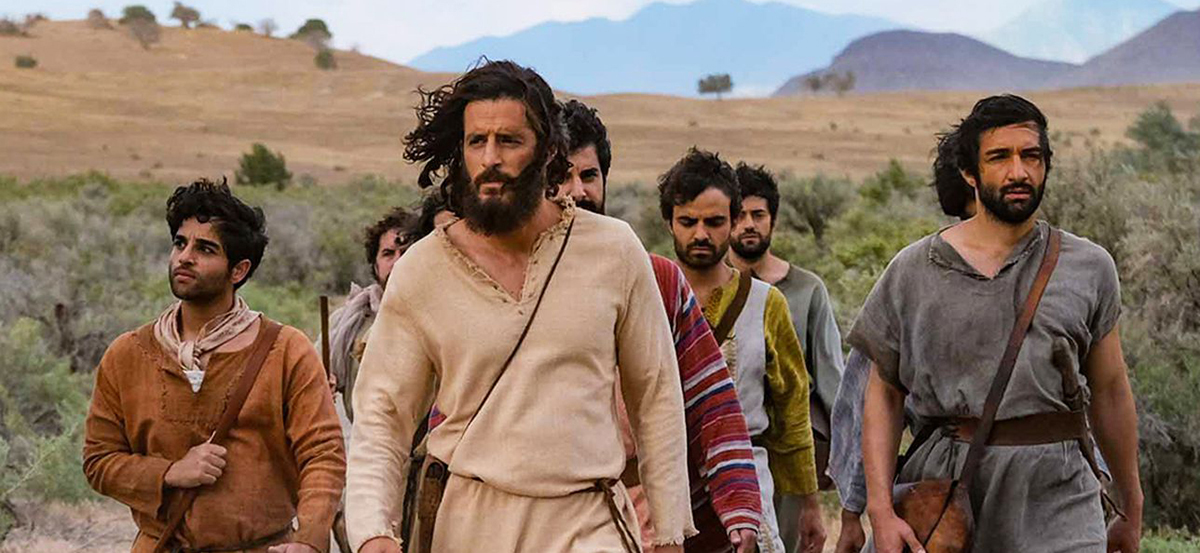“Do You Think I Am Still a Christian?”
By Martin Thielen
November 1, 2023

A scene from “The Chosen”
My work with Doubter’s Parish puts me in correspondence with large numbers of people. Many of them ask interesting questions about God, Jesus, faith, theology, and church. For example, a few months ago a reader who no longer believes in traditional Christianity asked me, “Do you think I am still a Christian?” That question captured my imagination and sparked questions of my own. So, with the permission of the person who asked the question, I’d like to share his story.
“Jason” (not his real name) grew up in an evangelical church. He held theologically conservative beliefs, served as a leader in his youth group, and considered becoming a minister. However, like many young adults, Jason began questioning his faith during college and eventually dropped out of church.
Years later, after establishing his legal profession and starting a family, Jason decided that he wanted to return to church. However, his old evangelical theology no longer worked for him. So he joined a Presbyterian (USA) congregation. In spite of actively participating at his church, including several stints in lay leadership roles, Jason constantly struggled with doubt. He finally decided that he no longer believed in orthodox Christianity. His attendance at church began to wane. Eventually, he stopped going altogether. However, he never lost interest in spiritual matters and still maintained a strong affinity for Jesus.
Watching The Chosen
About a year ago, Jason signed up for my Doubter’s Parish newsletter and began reading materials on the site. Since then, we’ve corresponded numerous times. Several months ago he began watching a show called The Chosen, a television series about the life and ministry of Jesus (which has mostly been supported through crowdfunding). More than three hundred million people have watched the ongoing series, which can now be found on several streaming services, including Amazon Prime Video.
Jason, well read in the field of religion, is theologically sophisticated. For example, he’s read numerous books by the late Bishop Spong and concurs with his conclusions, including a rejection of traditional Christian theism. Jason readily admits that he doesn’t believe the theology of The Chosen, which depicts a divine Jesus performing miracles, casting out demons, and acknowledging that he is the Messiah. “And yet,” says Jason, “I am gripped by this retelling of the gospel. For example, when I watched the episode where Jesus called Simon Peter to follow him, I felt deeply moved and even cried. In spite of all my doubts about the Christian faith, I just can’t shake my emotional connection to Jesus.”
In short, Jason has “deconstructed” his traditional faith. He no longer believes in a theistic theology of “the man upstairs.” Nor does he believe in the divinity of Christ, including a virgin birth, the miracle stories, or a physical resurrection. Instead, like many others, including large numbers of religious scholars, Jason believes that the original narratives of Jesus evolved over time, leading to stories about his divinity, which was a common occurrence in the ancient world for revered figures (see Bart Ehrman’s book, How Jesus Became God ). And yet, in spite of rejecting a supernatural God and a divine Christ, Jason remains strongly committed to the human Jesus and attempts to follow his example and teachings.
How Do You Define Christian ?
After sharing his story, Jason asked me his provocative question, “So, do you think I am still a Christian?” I wasn’t sure how to respond. I mulled it over for a long time. I finally said, “I guess it depends on how you define Christian. If you define it historically (affirming belief in ancient creeds and orthodox doctrines), the answer is likely no. However, if you define Christian as “one who follows Jesus” (which seems to be the earliest definition of a Christian), the answer is probably yes.” I quickly added that my thinking on this matter was tentative and I needed to further reflect on the subject.
It’s going to be interesting to follow Jason’s story. He’s considering returning to church but is still uncertain about that. Although he’s skeptical about institutional religion, he likes the idea of being part of a community that remembers and proclaims the Jesus story, however imperfectly. Regardless of what he eventually decides about church affiliation, Jason is serious about following the example and teachings of Jesus, which he believes leads to a purposeful, meaningful, and well-lived life.
I share Jason’s story not because it’s unique but because it’s common. I hear from people all the time who feel the same way. As one reader recently told me, “I’m not sure if I still believe in God, but I do believe in Jesus.” Readers of Doubter’s Parish often tell me they no longer refer to themselves as “Christians.” Instead, they call themselves “followers of Jesus.” I find that to be an exceptionally interesting distinction.
Believing in “Jesusanity” More than Christianity
I have a name for this phenomenon. I call it “Jesusanity.” In short, “Jesusanity” is following the human Jesus rather than the divine Christ. And a lot of people, at least the ones I have contact with, are adherents of this kind of faith. Some attend church. Some don’t. But they all seek to follow Jesus of Nazareth.
My fascination with “Jesusanity” prompted me to include it in my novel, An Inconvenient Loss of Faith (a free download is available on this site ). The novel tells the story of Reverend Paul Graham, a doubting southern clergyman who loses traditional faith, quits the ministry, and forges a new life, faith, and vocation beyond the constraints of institutional religion. In one scene Paul tells his best friend Bill (a religion professor):
Belief or Behavior?
Both positions make good arguments for their case. For example, traditionalists argue, correctly, that for most of its history, Christianity has defined faith as believing in certain doctrinal beliefs about God and Christ, including the divinity of Jesus, as seen in The Apostles’ and Nicene Creeds.
Nontraditionalists argue, also correctly, that when Jesus called his first disciples, he didn’t say a word about doctrine. Instead, he simply said, “Follow me.” They also note that Jesus’s core teachings (the Great Commandment, the Golden Rule, the Sermon on the Mount, and the parables) had virtually nothing to do with religious beliefs and everything to do with living a life of integrity and love. They also note that during the first two centuries of the Jesus movement, the primary focus was on behavior, not beliefs.
Of course, many people would say that authentic Christianity demands both belief and behavior. In short, they argue that being a Christian requires orthodoxy (correct beliefs) and orthopraxy (correct behavior). And they may well be correct. If so, that means Jason (and others like him) are not Christians. Perhaps, if a person truly attempts to follow Jesus, the “Christian” label doesn’t matter that much. But for Jason and many others, having a Christian identity does matter.
So I continue to mull over Jason’s provocative question, “Do you think I am still a Christian?” I don’t have a definitive answer yet. Therefore, I would be interested to know, what do you think? Is Jason still a Christian? Why do you feel that way? If you would like to respond, I’d love to hear from you.
AUTHOR’S NOTE
To share this post, please click the appropriate icon at the bottom of the page. If you would like to communicate with me, feel free to send an email and I’ll respond as soon as possible. To receive my monthly newsletter (a brief email notification alerting you to new posts and other materials), please do so today. Thank you for your interest in Doubter’s Parish. Writing for you is a joy.
